#menippus
Text
Wisdom from the Early Cynics, Diogenes 10
Diogenes would praise those who were about to marry and refrained, those who intending to go a voyage never set sail, those who thinking to engage in politics do no such thing, those also who purposing to rear a family do not do so, and those who make ready to live with potentates, yet never come near them after all.
He used to say, moreover, that we ought to stretch out our hands to our friends with the fingers open and not closed.
Menippus in his Sale of Diogenes tells how, when he was captured and put up for sale, he was asked what he could do.
He replied, "Govern men." And he told the crier to give notice in case anybody wanted to purchase a master for himself.
Having been forbidden to sit down, "It makes no difference," said he, "for in whatever position fishes lie, they still find purchasers."
—Diogenes Laërtius, 6.29

3 notes
·
View notes
Text
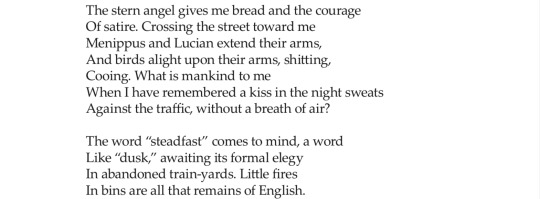
The stern angel gives me bread and the courage
Of satire. Crossing the street toward me
Menippus and Lucian extend their arms,
And birds alight upon their arms, shitting,
Cooing. What is mankind to me
When I have remembered a kiss in the night sweats
Against the traffic, without a breath of air?
The word “steadfast” comes to mind, a word
Like “dusk,” awaiting its formal elegy
In abandoned train-yards. Little fires
In bins are all that remains of English.
—Donald Revell, from "Senesco Sed Amo"
0 notes
Text
“As he went, he put questions to me about earthly affairs, beginning with, What was wheat a quarter in Greece? had we suffered much from cold last winter? and did the vegetables want more rain? Then he wished to know whether any of Phidias’s kin were alive, why there had been no Diasia at Athens all these years, whether his Olympieum was ever going to be completed, and had the robbers of his temple at Dodona been caught? I answered all these questions, and he proceeded:—‘Tell me, Menippus, what are men’s feelings towards me?’ ‘What should they be, Lord, but those of absolute reverence, as to the King of all Gods?’ ‘Now, now, chaffing as usual,’ he said; ‘I know their fickleness very well, for all your dissimulation. There was a time when I was their prophet, their healer, and their all, And Zeus filled every street and gathering-place. In those days Dodona and Pisa were glorious and far-famed, and I could not get a view for the clouds of sacrificial steam. But now Apollo has set up his oracle at Delphi, Asclepius his temple of health at Pergamum, Bendis and Anubis and Artemis their shrines in Thrace, Egypt, Ephesus; and to these all run; theirs the festal gatherings and the hecatombs. As for me, I am superannuated; they think themselves very generous if they offer me a victim at Olympia at four-year intervals. My altars are cold as Plato’s Laws or Chrysippus’s Syllogisms.’
So talking, we reached the spot where he was to sit and listen to the prayers. There was a row of openings with lids like well-covers, and a chair of gold by each. Zeus took his seat at the first, lifted off the lid and inclined his ear. From every quarter of Earth were coming the most various and contradictory petitions; for I too bent down my head and listened. Here are specimens. ‘O Zeus, that I might be king!’ ‘O Zeus, that my onions and garlic might thrive!’ ‘Ye Gods, a speedy death for my father!’ Or again, ‘Would that I might succeed to my wife’s property!’ ‘Grant that my plot against my brother be not detected.’ ‘Let me win my suit.’ ‘Give me an Olympic garland.’ Of those at sea, one prayed for a north, another for a south wind; the farmer asked for rain, the fuller for sun. Zeus listened, and gave each prayer careful consideration, but without promising to grant them all; Our Father this bestowed, and that withheld. Righteous prayers he allowed to come up through the hole, received and laid them down at his right, while he sent the unholy ones packing with a downward puff of breath, that Heaven might not be defiled by their entrance. In one case I saw him puzzled; two men praying for opposite things and promising the same sacrifices, he could not tell which of them to favour, and experienced a truly Academic suspense of judgement, showing a reserve and equilibrium worthy of Pyrrho himself.
The prayers disposed of, he went on to the next chair and opening, and attended to oaths and their takers. These done with, and Hermodorus the Epicurean annihilated, he proceeded to the next chair to deal with omens, prophetic voices, and auguries. Then came the turn of the sacrifice aperture, through which the smoke came up and communicated to Zeus the name of the devotee it represented. After that, he was free to give his wind and weather orders:— Rain for Scythia today, a thunderstorm for Libya, snow for Greece. The north wind he instructed to blow in Lydia, the west to raise a storm in the Adriatic, the south to take a rest; a thousand bushels of hail to be distributed over Cappadocia.”
- Lucian, Icaromenippus
#a working day in a god's life#sounds pretty tedious#lucian of samosata#loukianos#excerpts#zeus#and his job
1 note
·
View note
Text
I am pretending that i am dead

#I am pretending that i am dead crack
Let Hermes pay for me: he put me on board. So you are to come all that way for nothing?
#I am pretending that i am dead crack
"Eggs were often used as purificatory offerings and set out in front of the house purified." Id.īawl away, Charon, if it gives you any pleasure.Īnd who is so poor that he has not got a penny?Īnd I'll crack your skull with this stick. In the Greek, "a Hecate's repast lying at a street corner." "Rich men used to make offerings to Hecate on the 30th of every month as Goddess of roads at street corners and these offerings were at once pounced upon by the poor, or, as here, the Cynics." Jacobitz.Ģ. Oh, well, let them off, if you care about it but tell all the others what I said.ġ. No, no, Diogenes leave Sparta alone that is going too far your other commissions I will execute. As for your Spartans, you will not mind scolding them, from me, upon their present degeneracy? Tell them to dry their tears and cease their cries explain to them that here one man is as good as another, and they will find those who were rich on earth no better than themselves. There are a great many of them, very sorry for themselves and resentful of their helplessness. Yes, my Spartan, and here is for the poor. That is to the handsome and strong yes, I can manage that. Inform them that auburn locks, eyes bright or black, rosy cheeks, are as little in fashion here as tense muscles or mighty shoulders man and man are as like as two peas, tell them, when it comes to bare skull and no beauty. Then tell them from me to go to the devil.Īnd then, my most obliging of Polluxes, there is this for the rich:-O vain fools, why hoard gold? why all these pains over interest sums and the adding of hundred to hundred, when you must shortly come to us with nothing beyond the dead-penny?Īh, and a word to the handsome and strong Megillus of Corinth, and Damoxenus the wrestler will do. Oh, but if I say anything against their wisdom, they will call me an ignorant blockhead. May I give you another message to those same philosophers?Ĭharge them generally to give up playing the fool, quarrelling over metaphysics, tricking each other with horn and crocodile puzzles and teaching people to waste wit on such absurdities. Old, bald, with a cloak that allows him plenty of light and ventilation, and is patched all colours of the rainbow always laughing, and usually gibing at pretentious philosophers. Tell him this, and mention that he had better stuff his wallet with plenty of lupines, and any un-considered trifles he can snap up in the way of pauper doles 1 or lustral eggs. Pollux, I have a commission for you next time you go up-and I think it is your turn for earth to-morrow-if you come across Menippus the Cynic-you will find him about the Craneum at Corinth, or in the Lyceum, laughing at the philosophers' disputes-well, give him this message:-Menippus, Diogenes advises you, if mortal subjects for laughter begin to pall, to come down below, and find much richer material where you are now, there is always a dash of uncertainty in it the question will always intrude-who can be quite sure about the hereafter? Here, you can have your laugh out in security, like me it is the best of sport to see millionaires, governors, despots, now mean and insignificant you can only tell them by their lamentations, and the spiritless despondency which is the legacy of better days. A Necromantic Experiment DIALOGUES OF THE DEAD 1 - 20, TRANSLATED BY H.

0 notes
Text
Parallels: Olidammara the Laughing Rogue / The Cynics Diogenes and Menippus

Olidammara the Laughing Rogue (Deities & Demigods, 2002, illustration by M. Cavotta) / Diogenes bites Plato (Existential Comics #219)
1. Hecate’s Supper
Diogenes of Sinope (c. 412 – 323 BCE) was like the Oscar Wilde of his time. His snark was immensely popular, and for centuries after his death, if you wanted to say something sarcastic and make people pay attention, you'd just go ahead and say it and attribute it to him. (Which is why it's so hard today to determine what Diogenes actually said and what he didn't.) Alternatively, you could write a book with Diogenes as the protagonist, maybe another Cynic as well, and use them as your snarky mouthpieces.
That's what Lucian of Samosata (c. 125 – 180 CE) did, in his Dialogues of the Dead. These take place in Hades, and feature the philosophers Menippus of Gadara (3rd century BCE) and Diogenes, now dead, snarking from the Underworld and pumping the cynicism to eleven. And I remembered this wonderful satirical work while I was reading an old article in Dragon Magazine about Olidammara the Laughing Rogue, the classic D&D deity (in the Greyhawk pantheon) of thieves, beggars, and bards. It says:
"Shrines of Olidammara's faith are far more common than temples and may be found in urban or rural areas. Usually the shrine is just a pile of stones or an outdoor alcove bearing his mark where worshippers can pour an offering of wine or leave a bit of tasty food and a few copper coins. It is not considered an affront to the god for someone truly poor to take these coins, although stories exist of misers being punished for daring to take what is not their due."

A humble shrine to Olidammara, illustration by Andrew Hu (Dragon #342)
This bit about poor people pilfering offerings from a god's shrine was familiar. In Dialogues of the Dead, when Menippus dies, he gets immediately in trouble with Charon, the boatman, because he's supposed to have coins for the fare and he emphatically doesn't. (He's a Cynic, being penniless is his thing.) When Charon insists to be paid, Menippus wisely explains that he cannot give what he doesn't have, and when he gets frisked, all he has to show are lupin beans and a “Hecate's supper”. Now lupin beans are basically livestock food, humans only resort to them when destitute. And Hecate's supper? Well Hecate was the goddess of roads among other things, and she had shrines in street corners (particularly where three roads meet). People left offerings there every month “and these offerings were at once pounced upon by the poor, or, as here, the Cynics.”
It's not clear what Hecate thought about this plundering of her shrines, or what people imagined she thought. It's abundantly clear that the hungry didn't particularly care. But Olidammara approves as much as Menippus (and Lucian), which is pleasing. And that’s not the only parallel.

Diogenes Sitting in His Tub by Jean-Léon Gérôme (1860)
2. The rich remember
Olidammara drops some aphorisms
“Hoarded gold is no treasure. A man who lives alone with all of his money in a vault is poorer than a penniless man surrounded by merriment. What is the point of money and fine things if you cannot use them to bring you happiness? Better to spend your gold on food, wine, and music than let your mouth, ears, and mind go numb from nothingness.”
“A cage of gold is still a cage. A man surrounded by valuable things may think he is happy, but if he cannot leave his home for fear of his possessions being stolen, and cannot touch them for fear they might break, he is not actually happy. Take the man's things so he is no longer bound to them and can be free to live as nature intended.”
Meanwhile in Hades, Diogenes messages the living
To Menippus the Cynic: If mortal subjects for laughter begin to pall, come down below, and find much richer material; it is the best of sport to see millionaires, governors, despots, now mean and insignificant; you can only tell them by their lamentations, and the spiritless despondency which is the legacy of better days.
To the rich: O vain fools, why hoard gold? why all these pains over interest sums and the adding of hundred to hundred, when you must shortly come to us with nothing beyond the dead-penny?

Menippus (detail) by Diego Velázquez (1638)
and Shades of rich men file a complaint against Menippus
CROESUS: Pluto, we can stand this snarling Cynic no longer in our neighbourhood; either you must transfer him to other quarters, or we are going to migrate. Midas here, and Sardanapalus and I, can never get in a good cry over the old days of gold and luxury and treasure, but he must be laughing at us, and calling us rude names; "slaves" and "garbage," he says we are. And then he sings; and that throws us out. In short, he is a nuisance.
MENIPPUS: All perfectly true, Pluto. I detest these abject rascals! Not content with having lived the abominable lives they did, they keep on talking about it now they are dead, and harping on the good old days. I take a positive pleasure in annoying them. Well, you scum of your respective nations, let there be no misunderstanding; I am going on just the same. Wherever you are, there shall I be also; worrying, jeering, singing you down. Yours was the presumption, when you expected men to fall down before you, when you trampled on men's liberty, and forgot there was such a thing as death. Now comes the weeping and gnashing of teeth: for all is lost! You do the whining, and I'll chime in with a string of KNOW THYSELVES, best of accompaniments.

Incredible Romero-inspired cover for Lucian's Dialogues of the Dead: An Intermediate Greek Reader (Faenum Publishing, 2015)
3. And then they diverged
Of course, Olidammara isn't all Cynic. Cynics rejected wealth and luxury altogether and snubbed everything not necessary for survival, in the name of (basically) independence. The Laughing Rogue, on the contrary, wants you to grab all the finer things in life with both hands, and have a good time.
The kernel of Olidammara's philosophy is that life should be enjoyed, for a life of misery and boredom is a life wasted. Mortals should laugh, enjoy the company of friends and the playing of music, taste good food, and drink good wine. Although he is not a hedonist and doesn't believe that mortals should be, he knows that a lifetime of meat, fruit, wine, and song is better than a a life of bread, water, and silence (unsurprisingly he has no ascetic or monk worshippers). His faithful should treat music as the art it is and strive to be as skilled at it as their patron. People should make jokes and laugh when the joke is on them, and try to avoid misery, temperance, and solemnity, for they are the greatest poison to the soul. He encourages people to practice occasional mayhem not for its own sake but to add excitement to boring lives and rattle the self-built cages of materialists.
And, to return full circle to Hecate's supper, Olidammara is something more than that. He discovered a source of fulfillment, joy, and bliss that all the squabbling philosophers in the time of Diogenes somehow failed to grasp. That shifty thieving scoundrel is sharing.
Olidammara's Aphorism: “What is good alone is better with others. Any pleasurable thing is greater when you can share it with someone else. A fine wine is sweeter when raised in toast to a friend. A romantic song is stronger as a duet. A good meal is more savory when shared with a hungry man. A memory is richer when reminiscing with someone who was there.”
And you know what? I’ll drink to that.

Illustration by Andrew Hu (Dragon #342)
[All excerpts about the Laughing Rogue are from the article “Core Beliefs: Olidammara” by Sean K. Reynolds (Dragon #342, 2006). All excerpts of Dialogues of the Dead are from The Works of Lucian of Samosata, transl. Henry Watson Fowler and Francis George Fowler (1905).]
#long post#diogenes#menippus#olidammara#trs#theory#d&d#how to rogue#fluff#the ecstasy of gold#the rich remember#patron deity
30 notes
·
View notes
Photo
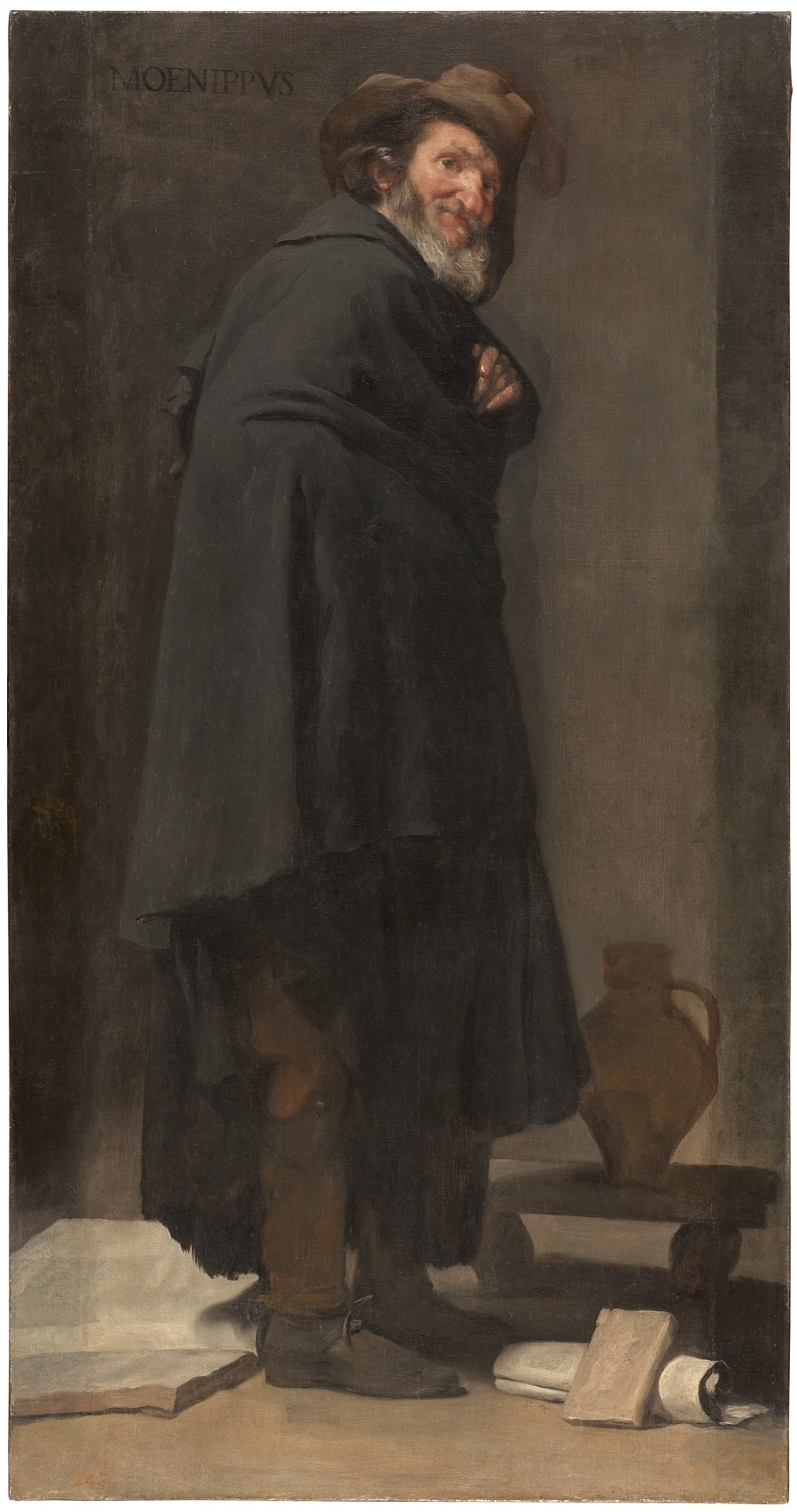
A painting of Menippus, by Valazquez. Menippus was a 3rd century Cynic satirist. There is an eponym [something named after someone] of satire for Menippus [Menippean Satire in writing] which is characterized as directing critique and ridicule at mental attitudes rather than individuals or groups. I use this when arguing first principles. Photo courtesy of the Prado Museum, Madrid, Spain.
0 notes
Photo
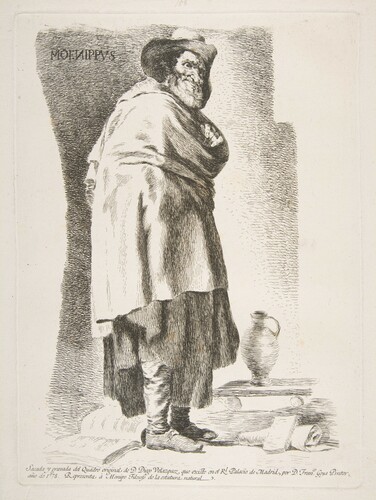
Menippus, after Velázquez, Goya, 1778, Metropolitan Museum of Art: Drawings and Prints
Harris Brisbane Dick Fund, Rogers Fund, and Gift of Theodore De Witt, by exchange, 1931
Size: Plate: 12 1/16 × 8 11/16 in. (30.6 × 22 cm) Sheet: 16 in. × 11 3/8 in. (40.7 × 28.9 cm)
Medium: Etching
https://www.metmuseum.org/art/collection/search/333958
7 notes
·
View notes
Quote
And as for myself, O Menippus, my mother taught me a story about the wisdom of Aesop when I was a mere child, and told me that he was once a shepherd, and was tending his flocks hard by a temple of Hermes, and that he was a passionate lover of wisdom and prayed to Hermes that he might receive it. Many other people, she said, also resorted to the temple of Hermes asking for the same gift, and one of them would hang on the altar gold, another silver, another a herald's wand of ivory, and others other rich presents of the kind. Now Aesop, she said, was not in a position to own any of these things; but he saved up what he had, and poured a libation of as much milk as a sheep would give at one milking in honor of Hermes, and brought a honeycomb and laid it on the altar, big enough to fill the hand, and he thought too of regaling the god with myrtle berries, or perhaps by laying just a few roses or violets at the altar. 'For,' said he, 'would you, O Hermes, have me weave crowns for you and neglect my sheep?'
Now when on the appointed day they arrived for the distribution of the gifts of wisdom, Hermes as the god of wisdom and eloquence and also of gain and profit, said to him who, as you may well suppose, had made the biggest offering: 'Here is philosophy for you'; and to him who had made the next handsomest present, he said: 'Do you take your place among the orators'; and to others he said: 'You shall have the gift of astronomy or you shall be a musician, or you shall be an epic poet and write in heroic metre, or you shall be a writer of iambics.'
Now although he was a most wise and accomplished god he exhausted, not meaning to do so, all the various departments of wisdom, and then found that he had quite forgotten Aesop. Thereupon he remembered the Hours, by whom he himself had been nurtured on the peaks of Olympus, and bethought him of how once, when he was still in swaddling clothes, they had told him a story about the cow, which had a conversation with the man about herself and about the earth, and so set him aflame for the cows of Apollo. Accordingly he forthwith bestowed upon Aesop the art of fable called mythology, for that was all that was left in the house of wisdom, and said: "Do you keep what was the first thing I learnt myself."
Philostratos, Life of Apollonius of Tyana (translated by F.C. Conybeare)
#philostratus#hermes#aesop#wisdom#horai#ancient greece#hellenic deities#quotes#philostratos#life of apollonius of tyana#apollon#fables
17 notes
·
View notes
Photo
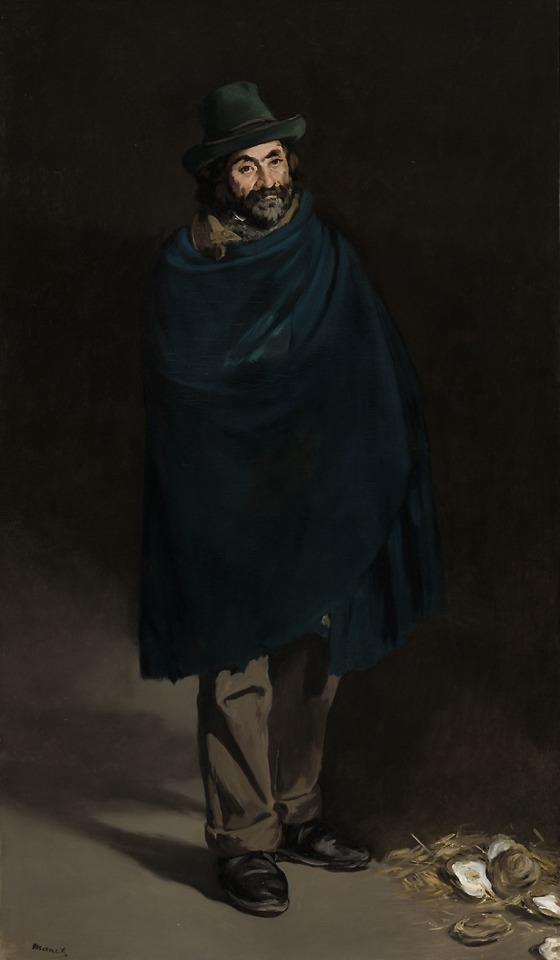
Beggar with Oysters (Philosopher), Édouard Manet, 1860, Art Institute of Chicago: European Painting and Sculpture
By age 30, Édouard Manet had gained recognition at the state-sponsored Salon exhibition in Paris and established himself as the artist to watch, creating new imagery for contemporary works that translated Old Master painting into a modern idiom. Here he looked to the 17th-century Baroque artist Diego Velázquez, whose two paintings of world-weary philosophers (Aesop and Menippus, both c. 1638) Manet had admired that year at the Museo del Prado in Madrid, Spain. Like Velázquez’s representation of the ancient stoics (whose poverty is associated with wisdom), Manet’s beggar-philosophers fit into the popular notion of the social outcast as a seer possessing rare insight. This painting and Beggar with a Duffle Coat were probably conceived as companion pieces. Arthur Jerome Eddy Memorial Collection
Size: 188.0 × 111.0 cm (74 × 43 5/16 in.)
Medium: Oil on canvas
https://www.artic.edu/artworks/8969/
8 notes
·
View notes
Text
all this “moon landing” stuff is ridiculous. everyone knows that the first man on the moon was empedocles after being launched up there by mount etna. he’s been living off of dew this entire time
#this is about icaro-menippus bls dont take this seriously#x. pushed a pluralist into mt etna just to watch him die 》 shitpost.
0 notes
Note
hi!! i’d really like to get into classics & latin and such, where do you recommend we start? any websites, books, etc you really like?
hey! this is a big question with a big answer, because classics is an enormous field with an immense body of literature and i simply have to say words, so there are a lot of them under the cut.
in terms of starting latin: there are a lot of different beginner’s latin textbooks out there, and your mileage is going to vary with each of them. the ones i own or have used include:
the cambridge latin course
ecce romani
smith & thompson’s first-fourth year latin (one book per year)
using latin (horn, gunmere, & forbes)
the oxford latin course
learning latin from the romans
wheelock’s latin
in my personal opinion, these are all fundamentally solid texts and you can get a good start with any of them. my recommended course of action would be to get one of them and work your way through it from start to finish, which should give you a strong foundation for grammar and syntax and a decent vocabulary. if that’s not something that would work for you, there are classes that you can take online, but i can’t vouch for any of those!
i can’t necessarily recommend a specific starting point for getting into classical texts, because it really depends on what you’re interested in! “classics” covers a broad time period (well over a thousand years) and a wide variety of genres, styles, topics, etc. here is a wildly overly simplistic guide to some of them, with associated playwrights/authors/poets:
epic: long poems that deal with the realm of gods and heroes. greek: homer, hesiod, apollonius of rhodes; roman: vergil, ovid, lucretius, lucan, statius
comedy: plays intended to make you laugh, in which bad things happen but you don’t feel bad about it. greek: aristophanes; roman: plautus, terence
tragedy: plays intended to make you cathart, in which bad things happen and you do feel bad about it. greek: aeschylus, sophocles, euripides; roman: seneca the younger (with one bonus unattributed play, octavia)
satire: works intended to ridicule someone or something. three general distinctions: horatian (gentle, more sympathetic, exemplified by horace), juvenalian (angry, pessimistic, exemplified by juvenal), and menippean (written in prose, attacks attitudes rather than individuals, exemplified by menippus except we don’t have any of his work so it’s better exemplified by seneca’s apocolocyntosis [pumpkinification] and petronius’s satyricon)
poetry: it’s poetry! in metered verse, sung in greek and recited in latin. greek: sappho, pindar, alcaeus, anacreon (and others, generally found in volumes of greek lyric poetry); roman: catullus, horace, tibullus, propertius, ovid
philosophy: guys just saying stuff! there are a lot of different schools of greek philosophy, which you can certainly read more about if you’re interested. greek: plato, aristotle, xenophon, epicurus, zeno (&c &c); roman: lucretius, cicero, seneca the younger, marcus aurelius
this is by no means exhaustive, but it’s a decent start for what you might be interested in—e.g., if you’re into Drama and Emotion, you might want to look into tragedies; if you’re into old man yelling at cloud, you might want to look into juvenalian satire; if you’re into politics, you might want to check out philosophy (particularly aristotle and cicero). the more you read, there’s a good chance that you’ll end up falling in love with one specific text, genre, or author, which will open up to areas of further study and exploration. (personally, i am extremely partial to the aeneid, catullus, and aristophanes’ lysistrata.)
(side note: one of the things i recommend the most is reading multiple translations if they’re available—no singular english text is going to capture every nuance of the original greek/latin, and it can be extremely helpful to look at different versions. with lysistrata, for example, i’ve read two translations, one by benjamin bickley rogers and one by jeffrey henderson, and each of them provides a wildly different experience of the play.)
of course, greek and roman texts themselves are by no means the extent of the available literature. in terms of books about the classics, i recommend finding out what you in particular are interested in—is it a particular aspect of society? a period of history? a specific historical or mythological figure? an area of study?—and looking for texts that discuss that. there are plenty of broader overviews as well, which can be a little overwhelming. college classics reading lists can be a good resource to see which ones are currently In Vogue, if you will (e.g. the “suggested secondary reading” for balliol college at oxford or this one from king’s college at cambridge).
for websites: there are a ton of these as well! most of these are going to be more fruitful when you’re further along in studying, but compendia of resources like electronic resources for classicists and williams online resources are wonderful places to look.
#there is a LOT more i could say but i need to have dinner so!!#lmk if u have any follow up questions!!!#anonymous#ask
29 notes
·
View notes
Note
Hello! I hope you're well these days! I have a question if you have the time, which lighthearted Greek series would you recommend from 2010 onwards? No subs needed
Hi there! Here are some cheerful / comedic series since 2010 that I like. All can be found on youtube.
Μην αρχίζεις τη μουρμούρα (Don’t start grumbling)
Domestic comedy (2013 - still going). Just a generally realistic but humorous portrayal of the domestic life of couples of different generations.

Η οικογένεια βλάπτει (Family is bad for you)
Family comedy (kinda) (2009-2010). Yerasimos decides to live with Christina and meet her family but everyone in it is crazier than the next.

Κάτω Παρτάλι (Kato Partali)
Black comedy (2014-2015). After Konstantinos loses his job and his rich sister finds her husband cheating on her and being persecuted for financial fraud, they both agree to follow Myrto, Konstantinos’ girlfriend, to her village Kato Partali. They’ll soon find out there’s something really wrong with this village and its inhabitants.

Ο Πόλεμος των Άστρων (Star Wars)
Astrological / Romantic Comedy (2010 - 2011) Every two episodes are the love story of two different zodiac signs.

Ουκ αν λάβοις παρά του μη έχοντος (Don’t take money from the one who has none) The title is in Ancient Greek btw.
Animation / Satire / Comedy (2010 - 2011) Charon (the Greek mythological equivalent of the Reaper) wants to retire but he still needs the money the cynic satirist Menippus owes him, which is why he escaped the Underworld. Charon and God Hermes (who led the dead to the Underworld) try to help Menippus to make money and pay his debt to Charon. The series is a satire of the social and political situation of the country and the world as well as several famous people and characters of pop culture.
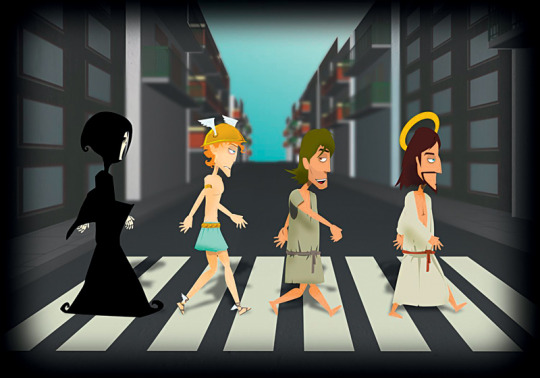
Το αμάρτημα της μητρός μου (My mother’s sin)
Romantic comedy (2012 - 2013) Wealthy Stefanos Megapanos meets hairdresser Katia Tsirighoti and after a bad start, they eventually fall madly in love for each other. Because they are old with grown children, they decide to keep the relationship initially a secret but things get a lot more complicated when their children also fall for each other.

These are the ones I enjoyed the most. However, if you haven’t given the chance to shows prior to 2010, I can recommend you many great classic ones. Basically the golden period of Greek TV is 1990-2010 because after that the crisis generally hit the budget and the creativity.
26 notes
·
View notes
Quote
Another place to find bodies, and more particularly necromantically exploitable ghosts of the dead, was on battlefields. The dead soldiers in such plentiful supply and so readily accessible there were especially prone to restlessness. Custom dictated that the victors should bury their own dead, and, if not the dead of the enemy as well, that they should then allow the enemy camp the opportunity to make its own arrangements. But in practice, battles left a large number of soldiers inadequately buried, so that dead warriors were often also unburied. The restless ghost of one such warrior took possession of a boy from whom Apollonius of Tyana had to exorcise it. Battlefields were, accordingly, a suitable place for the deposition of curse tablets for activation by restless ghosts. The proliferation of the warrior-dead is already clear from Homer. They dominate the hosts summoned up by Odysseus. And when Lucian's Menippus boards Charon's barge to cross the Styx on his journey to the underworld, the boat is full of groaning soldiers displaying wounds from one war or other.
Daniel Ogden - Greek and Roman Necromancy
36 notes
·
View notes
Photo
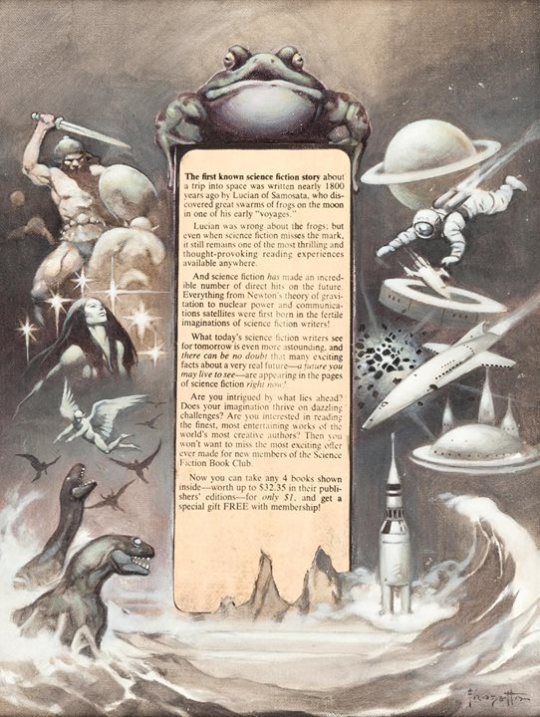
Lucian of Samosata (125 – 180 AD) Frank Frazetta (1928 - 2010) FRAGMENT FROM SAMOSATA’S “Icaromenippus, an Aerial Expedition”: “Menippus of Gadara: -Let me see, now. First stage, Earth to Moon, 350 miles. Second stage, up to the Sun, 500 leagues. Then the third, to the actual Heaven and Zeus’s citadel, might be put at a day’s journey for an eagle in light marching order. FRAGMENT FROM SAMOSATA’S “The True History”: “I am now to put on record the novelties and singularities which attracted my notice during our stay in the Moon. When a man becomes old, he does not die, but dissolves in smoke into the air. There is one universal diet; they light a fire, and in the embers roast frogs, great numbers of which are always flying in the air. They then sit round as at table, snuffing up the fumes which rise and serve them for food. Their drink is air compressed in a cup till it gives off a moisture resembling dew” https://ift.tt/2G2cqnh April 04, 2019 at 02:57PM
3 notes
·
View notes
Text
In fact, could one make observations from the Moon, as did Menippus, considering the numberless agitations of the Earth, one would think one saw a swarm of flies or gnats fighting among themselves, struggling and laying traps, stealing from one another, playing, gamboling, falling, and dying, and one would not believe the troubles, the tragedies that were produced by such a minute animalcule destined to perish so shortly.
— Michel Foucault, Madness and Civilisation
0 notes
Photo
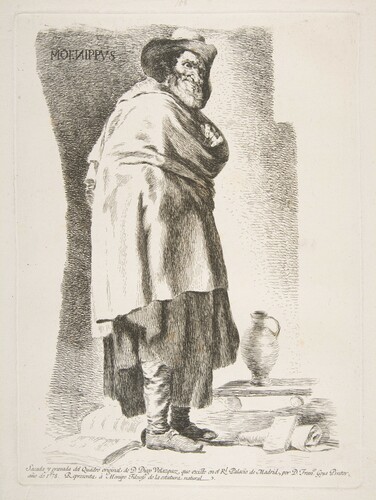
Menippus, after Velázquez, Goya, 1778, Metropolitan Museum of Art: Drawings and Prints
Harris Brisbane Dick Fund, Rogers Fund, and Gift of Theodore De Witt, by exchange, 1931
Size: Plate: 12 1/16 × 8 11/16 in. (30.6 × 22 cm) Sheet: 16 in. × 11 3/8 in. (40.7 × 28.9 cm)
Medium: Etching
https://www.metmuseum.org/art/collection/search/333958
5 notes
·
View notes